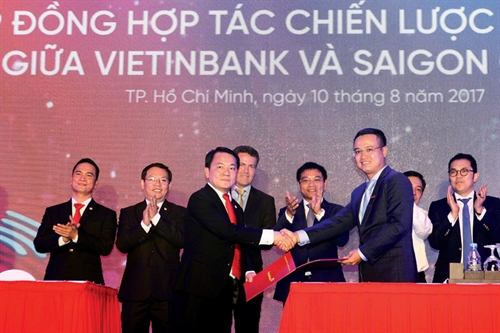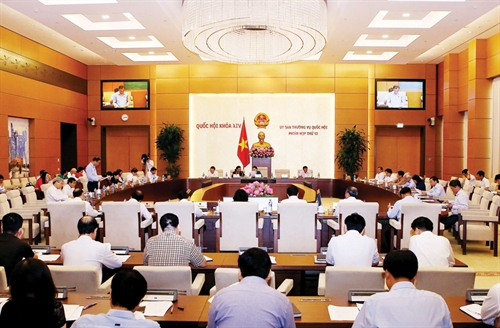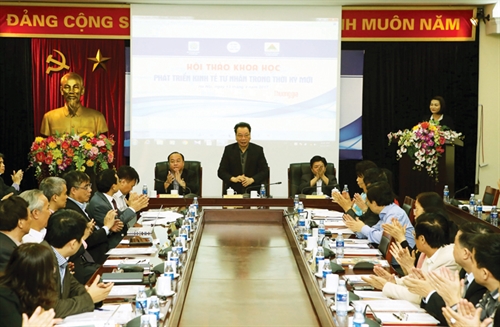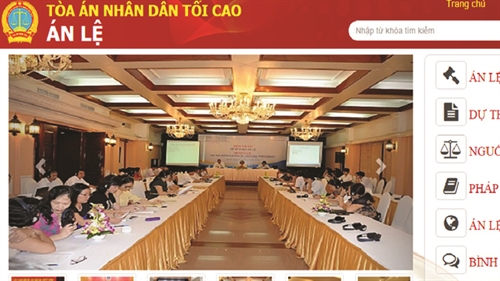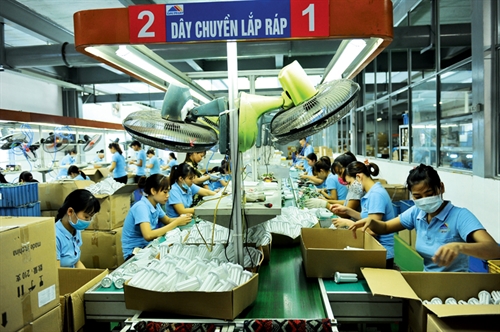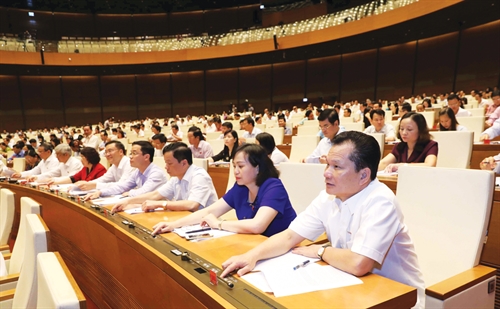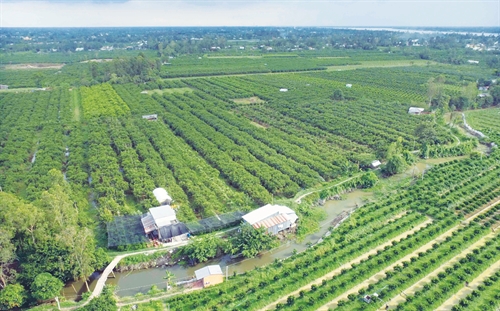- GUIDING VIEWPOINTS
SOEs operate under the market mechanism, taking economic efficiency as a major assessment criterion, enjoy autonomy, take self-responsibility and compete on an equal footing with enterprises from other economic sectors under law. Publicity, transparency and accountability of SOEs must be ensured. The SOEs’ tasks of production and trading of common goods and provision of common services must be separated from their tasks of production and trading of public-utility goods and provision of public services.
The quality, efficiency and competitiveness of SOEs must be improved to properly perform the role of leading the development of enterprises from other economic sectors, ensuring that Vietnamese enterprises will truly become a key force for socio-economic development, industrialization and modernization, and building an independent and self-reliant economy in the context of globalization and international integration.
Restructuring and renewing SOEs under the market mechanism is a constant and continuous process with rational methods and roadmap. SOE restructuring must be stepped up toward determinedly equitizing and selling capital in SOEs in which the State does not need to hold or maintain dominant shares or capital contributions, including those operating efficiently and at the same time with weak SOEs must be dealt with, even allowing them to go bankrupt.
The efficiency and effectiveness of the management, supervision, examination and control of SOEs’ operations must be raised, avoiding loss and wasteful use of state capital and assets. The function of ownership of state capital and assets must be separated and clearly distinguished from the function of state management in all types of enterprises and the function of business governance of SOEs. Training and retraining to raise the governance level and capacity as well as moral qualities of SOEs’ leaders and managers must be intensified.
Leading methods and leadership capacity of party organizations must be renewed and enhanced; to bring into full play the role of the people, the Vietnam Fatherland Front and socio-political organizations in supervising the restructuring, renewal and raising of the efficiency of SOEs; and the legitimate and lawful rights and interests of laborers must be ensured and socio-political stability must be firmly preserved.
- OBJECTIVES
To restructure and renew SOEs and raise their efficiency on the basis of modern technologies and innovative and creative capacities and governance up to international standards in order to mobilize, allocate and use in an efficient manner social resources, and preserve and develop state capital in SOEs for them to firmly maintain the key position in and serve as an important material force of the state economy, contributing to boosting the economic development and realizing social advancement and equity.
Objectives through 2020
To restructure and renew SOEs during 2017-20 based on the criteria for classification of SOEs and state-invested enterprises in all fields and sectors. To complete the divestment of state capital from SOEs in which the State does not need to hold or contribute capital.
To focus on completely dealing with chronically inefficient and loss-making state economic groups and corporations as well as investment projects and works of SOEs.
To strive to meet international standards on business governance; to make an important stride in raising the efficiency of production and trading, product quality and competitiveness of SOEs.
To improve the model of management and supervision of SOEs and their state capital and assets. By 2018, to establish a specialized body representing the owner of SOEs and the State’s shares and capital contributions at enterprises.
Objectives through 2030
Most of SOEs will have a mixed ownership structure and mainly operate as joint stock companies.
Their technological level and modern production techniques will be equivalent to those of regional countries; international standards on business governance will be fully met; a pool of professional managers with high qualifications and good moral qualities will be formed.
To strengthen and develop a number of large-sized and efficiently operating state economic groups in some key economic sectors and fields that will be able to compete in the region and world.
- MAJOR TASKS AND SOLUTIONS
Based on the Party’s guidelines, the State’s policies and laws, and socio-economic development objectives and tasks in each period, to review and clearly determine the number and scope of fields and sectors which need SOEs and state-invested enterprises to draw up 5-year and annual plans on restructuring and equitization of SOEs and divestment of state capital in these enterprise on the following principles: Focusing on key and essential sectors, important and national defense and security geographical areas, and fields which are not interested in by enterprises from other economic sectors; reducing the state ownership rates to levels that are sufficient to substantially change business governance and attract truly capable investors; and maximizing the proceeds from the sale of state capital under the market mechanism.
To comprehensively review and assess and categorize SOEs and their investment projects and state capital and assets in order to work out appropriate restructuring and handling solutions. To resolutely deal with loss-making and inefficient SOEs and investment projects. To equitize, sell, contract out, lease, dissolve or put up for bankruptcy SOEs in which the State does not need to hold dominant shares or capital contributions or any shares or capital contributions at all. To restructure those in which the State still needs to hold 100 percent capital or dominant shares or capital contributions with appropriate mechanisms and policies.
To expand methods of selling shares and capital contributions, even selling entire SOEs; to apply the measure of bankruptcy under law to SOEs falling into a state of bankruptcy without feasible recovery plans. To restructure loss-making investment projects then transfer them to investors of other economic sectors. To clarify the responsibilities, and strictly handle under law violations of organizations and individuals leading to loss-making SOEs and investment projects.
To comply with law, respect the market mechanism and implement the roadmap for equitization and state capital divestment already approved by competent state agencies. To ensure the publicity and transparency in restructuring of SOEs, especially in equitization and state capital divestment. To apply advanced property valuation methods suitable to the market mechanism, ensuring state capital and assets and enterprises be fully, rationally, publicly and transparently valuated. To improve the institution on valuation of land, tangible property and intangible property (intellectual property, brand names, etc.) in the process of equitization under the market mechanism. To clearly define responsibilities of independent valuation consultancy organizations in the valuation of SOEs’ assets and capital and values as well as of these enterprises themselves. To clearly define responsibilities of the State Audit Office in auditing the valuation of SOEs and state capital and assets.
On the basis of the values of state capital and assets and SOEs which are fully, rationally and lawfully determined, to expeditiously sell shares and divest state capital in a public and transparent manner, mainly via competitive auctions. Equitization must be associated with listing stocks on the securities market. Equitized enterprises must be listed within one year after their initial public offerings. Those that fail to satisfy the stock listing conditions as prescribed by law must have plans on stock listing within a specified period under regulations.
To prohibit and strictly handle cases of under-valuation of state capital and assets and enterprises in contravention of law for self-seeking purposes, causing loss of state capital and assets.
When equitizing enterprises assigned to manage and operate state-invested infrastructure facilities and projects important to the economy, society, national defense or security, the State will exercise control on the following principles: The State uniformly owns important infrastructure facilities, while the equitized enterprises and investors that are transferred the operation right will only manage and operate such facilities; the selection of investors and enterprises must comply with the Law on Bidding and be carried out in a public and transparent manner; the national defense and security, national sovereignty and territorial integrity must be guaranteed.
To complete legal dossiers of assets prior to the re-arrangement or equitization of SOEs or divestment of state capital from these enterprises. To strictly implement the land lease mechanism under law. To efficiently use tax and charge policies in connection with stably enhancing the effectiveness of land planning work. To increase the management and strict control to ensure that investors fully perform their financial obligations toward the State when changing land use purposes after equitization.
To improve the effectiveness of existing institutions to support the restructuring and equitization of SOEs and divestment of state capital in these enterprises. To raise the capacity and operation efficiency of the State Capital Investment Corporation (SCIC), Vietnam Asset Management Company (VAMC), Debt and Asset Trading Corporation (DATC) and the Enterprise Arrangement and Development Support Fund under the market mechanism and law.
To encourage and attract strategic investors to participate in purchasing shares of, and contributing capital to, enterprises equitized or having state capital divested. To complete criteria of major and strategic shareholders that have financial, technological and governance capacities to restructure and develop enterprises.
To properly arrange, allocate and use employees; to train and deal with redundant laborers. To ensure the lawful rights of laborers, especially redundant laborers, stabilizing their livelihood and ensuring social security for them. To bring into full play the role and responsibilities of laborers as shareholders in participating in the management and supervision of SOEs, while adopting appropriate mechanisms to protect minority shareholders’ interests.
To drastically and effectively arrange, renew and develop, as well as raise the operational efficiency of, agricultural and forestry companies in light of the Political Bureau’s Resolution No. 30-NQ/TW of March 12, 2014. To properly organize the equitization and dissolution of agricultural and forestry companies, ensuring the rights of those who are contracted with land, water surface, perennial orchards and forests.
To implement in a synchronous manner solutions and adopt appropriate mechanisms and policies to make the financial status of SOEs healthy, thoroughly overcome their financial problems, non-performing loans and unprofitable assets.
To speed up the divestment of capital in non-core business lines, putting an end to thinned-out and scattered investment. To restructure SOEs based on their assigned tasks, core business lines, making the fullest use of their potentials and advantages; to thoroughly cut costs and improve the quality of their goods, services, reputation and brand names in the market.
To increase investment in and raise the capacity of SOEs to innovate, research, apply and transfer modern, energy-efficient and environment-friendly production technologies and techniques, considering this a decisive factor for higher productivity, quality, efficiency and competitiveness of SOEs.
To manage in a centralized manner proceeds from the equitization and state capital divestment and use them only for development investment, not for regular spending.
To further renew policies for SOEs to truly operate under the market mechanism
SOEs will participate in the performance of socio-political tasks assigned by the State under the mechanism in which the State places orders, selects SOEs in a competitive and public manner and clearly determines costs and funds for the performance, and responsibilities and benefits of the State and SOEs without affecting the business efficiency of SOEs.
The economic and financial relations between the State and SOEs, especially their rights and obligations, must be fully and transparently realized under law and the market mechanism.
To abolish direct administrative intervention and subsidy mechanisms applicable to SOEs and do away with discrimination against enterprises from other economic groups, especially in accessing state resources, credit, land, natural resources, investment and trading opportunities, finance and taxation, etc.
To bring into play the pioneering and leading role of SOEs in establishing and expanding production, supply and value chains in the country, region and world. To restrict closed, sectional and non-transparent production and trading activities of SOEs, especially state economic groups and corporations.
To renew the governance system and increase the capacity of SOE managers
To develop and apply a business governance framework up to international standards to SOEs, especially state groups and corporations; and concurrently organize training and re-training to increase the governance and management capacity and moral qualities of SOE managers, and create a healthy and effective business governance environment.
To strengthen and develop a number of large-sized and efficiently operating multi-owner state economic groups, which are capable of competing in the region and world in some key sectors and fields of the economy on the basis of improving the state economic group model in line with international practices; to clearly identify their operation scale and scope in compatibility with their governance and management capacity; to restructure their organization and personnel apparatus to be neat, effective and efficient; to perform clear assignment and decentralization.
To resolutely fight, and establish effective internal governance and control systems to prevent, detect, stop and handle illegal acts and conflicts of interests; and the connivance between SOE leaders and managers and state officials and private businesses to form “interest groups” and “backyards” and abuse their positions and powers to manipulate operations of SOEs for self-interests and corruption, causing losses to the State and enterprises.
To clearly define the tasks, powers and responsibilities of managerial titles in the governance apparatus of SOEs; to ensure responsibility in tandem with power. To raise the criteria, conditions and responsibilities of independent members of boards of directors.
Supervisory boards and individual supervisors must truly act as effective supervisory tools of owners, operate independently and not be led, directed or governed by the interests of members’ councils or boards of directors and executive boards of enterprises. General directors and members of executive boards of SOEs will be appointed or hired by their members’ councils or boards of directors, and perform their tasks and exercise their powers under law and their labor contracts.
To complete the system of incentives and economic levers coupled with enhancing the responsibility, discipline and observance of law in SOEs. To implement wage, bonus and remuneration policies for SOE laborers and managers in conformity with the market mechanism, which are highly competitive based on production and business results. To study and apply the mechanism of payment of salaries and bonuses to general directors and other key managers of enterprises under agreements with the latter. To apply the performance-based assessment system to each working position.
To exclude SOE managers from the system of civil servants and public employees. To extensively implement the recruitment and appointment mechanisms based on competitive, public and transparent examination for all managerial and executive titles and other working positions in enterprises.
To re-arrange, streamline and raise the effectiveness of the apparatus and payroll of SOEs; to reasonably restructure and arrange SOE leaders and managers; to increase training to raise professional qualifications, leadership capacity, political ideology, ethics and lifestyle of SOE leaders and managers; to adopt mechanisms and policies to attract and effectively employ highly skilled workers. To formulate a strategy for development of SOE leaders. To review and raise the standards and conditions on moral quality, leadership and management capacity and professional qualifications of SOE managers.
To ensure the transparency and publicity of SOEs and accountability of their managers, especially in the areas of finance, investment, procurement, use of state capital, business expenses and results, profit distribution, personnel, major transactions, transactions involving persons affiliated to managers, property and incomes of managers in conformity with international standards and domestic regulations. To improve accounting and auditing regulations and the financial reporting system up to international standards.
To improve state management of SOEs
To improve the function of state management of SOEs
- To review and improve the system of laws, mechanisms and policies on SOEs, especially the mechanisms and policies on state economic groups, management of state capital and assets at enterprises, and the restructuring, renewal and increasing of the efficiency of SOEs in line with the Party’s policies and guidelines, the practical situation as well as experiences learned over the past time.
- To increase the capacity, effectiveness and efficiency of the inspection, examination, audit and supervision by state management agencies of SOEs; to prevent, detect and strictly handle law violations, negative practices, and acts of corruption and wastefulness in SOEs. To clearly define the responsibilities of inspection and audit agencies for results of inspection and audit of SOEs. To improve the supervision system and indicators for evaluation of the safety and efficiency and ranking of SOEs and representatives of the owner of the State’s shares and capital contributions. To strictly manage and supervise the raising and use of capital by SOEs, especially foreign loans, domestic and overseas investment projects, capital sources for acquisition and merger of enterprises; to restrict to the maximum the issuance of government guarantee for SOEs; to establish and develop a unified and complete national database on SOEs and state capital and assets at enterprises.
- To enhance the direction, examination and supervision of the implementation of approved plans on equitization and state capital divestment. To enhance the responsibility of ministries, sectors and localities as well as organizations and individuals representing the state owner, especially leaders, in implementing the Party’s guidelines, the State’s policies and laws, approved plans on the restructuring and renewal of SOEs, particularly on equitization and state capital divestment, ensuring publicity and transparency.
To improve the organization to perform the function of the State as the owner of SOEs and the State’s shares and capital contributions at enterprises
- The State will fully perform the responsibilities of the owner of SOEs and the State’s shares and capital contributions at enterprises; truly play the role of an investor and owner that has same rights, obligations and responsibilities like other investors at enterprises. To ensure the right to autonomy of SOEs under the market rules. To respect the independence of members’ councils, board of directors, chairpersons of members’ councils and board of directors, general directors and executive boards of SOEs in exercising their rights and discharging their responsibilities to ensure transparent, accountable, professional and highly effective operation and governance.
- To expeditiously establish a specialized state body to represent the owner of SOEs in: (1) exercising the rights and discharging the responsibilities of the representative of the state owner of SOEs and the State’s shares and capital contributions at enterprises; (2) approving and supervising the SOE’s implementation of business production and business strategies and plans in line with socio-economic development plans and sectozral development master plans; and (3) coordinating with related agencies in properly implementing the law on organization and personnel work in enterprises.- (VLLF)
